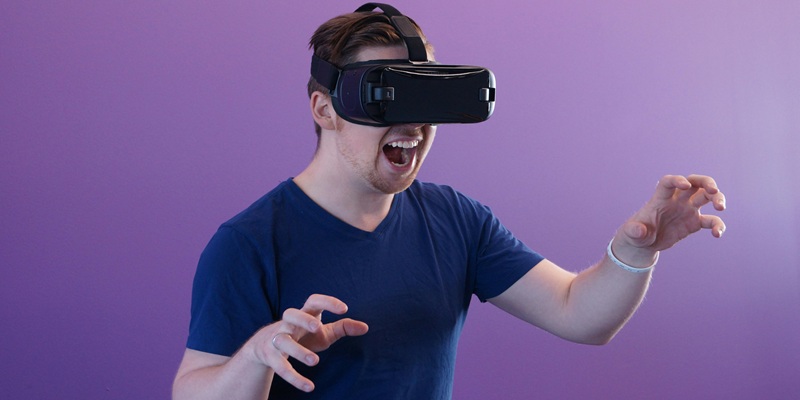The entertainment industry is growing with precision, driven by technological advancements that reshape how audiences experience live performances. Virtual Reality (VR) concerts have emerged as a revolutionary trend, offering fans immersive, interactive, and accessible experiences. This shift is redefining live entertainment, making it more inclusive, engaging, and futuristic. As technology continues to advance, VR concerts are expected to play an increasingly significant role in the music industry.
The Rise of Virtual Reality in Entertainment
The integration of virtual reality into entertainment is not a new concept. However, its adoption in live music performances has gained momentum in recent years. With the introduction of high-quality VR headsets and improved internet speeds, artists and event organizers are embracing VR to create unforgettable concert experiences. This transformation is fueled by the demand for more interactive and immersive ways to enjoy live performances.
How Virtual Reality Concerts Work
VR concerts leverage advanced technologies to create a digital environment where artists and audiences can interact. Here’s how they typically work:
- Virtual Venues: Artists perform in a digital venue that replicates a real-world stage or an entirely new, imaginative setting.
- Immersive Audio and Visuals: High-definition 360-degree visuals and spatial audio create an experience that mimics a real concert.
- Interactive Features: Audience members can engage with the artist, customize their avatars, and even socialize with other attendees.
- Multi-Platform Accessibility: These concerts are accessible through VR headsets, desktops, and even mobile devices, making them widely available.
The Benefits of Virtual Reality Concerts
Increased Accessibility and Inclusivity
One of the most significant advantages of VR concerts is their accessibility. Traditional concerts often require fans to travel long distances, purchase expensive tickets, and deal with venue limitations. VR concerts eliminate these barriers, allowing music lovers from around the world to participate without leaving their homes.
Cost-Effectiveness for Fans and Artists
Attending a live concert can be costly, with expenses covering tickets, transportation, and accommodations. VR concerts provide a more affordable alternative while still delivering a high-quality experience. Additionally, artists benefit from reduced production costs, eliminating the need for expensive venue rentals and logistics.
Unparalleled Immersion and Interactivity
Unlike traditional concerts, VR performances provide an immersive environment where fans feel as though they are standing right in front of the artist. The ability to move around the virtual venue, interact with visual effects, and engage in real-time with other attendees enhances the overall concert experience.
New Revenue Streams for Artists
VR concerts open up multiple revenue opportunities for musicians. Besides ticket sales, artists can monetize their performances through virtual merchandise, exclusive VIP experiences, and brand sponsorships. These new revenue streams make VR concerts a lucrative alternative to traditional touring.
Global Reach and Scalability
Physical concerts are limited by venue capacity and geographical restrictions. VR concerts, however, can accommodate an unlimited number of attendees from various locations. This scalability enables artists to reach a global audience without logistical challenges.
The Technology Powering Virtual Reality Concerts
Virtual Reality Headsets
High-quality VR headsets like the Oculus Quest, HTC Vive, and PlayStation VR provide users with an immersive experience by offering lifelike visuals and real-time motion tracking.
360-Degree Cameras and Spatial Audio
To capture the essence of a live performance, 360-degree cameras record concerts in a way that allows viewers to experience the event from multiple angles. Additionally, spatial audio enhances the sound experience, making it feel as if the music is surrounding the listener.
Artificial Intelligence and Motion Capture
AI-driven motion capture technology enables artists to perform in a virtual space while their real-life movements are translated into a digital avatar. This innovation makes VR concerts more dynamic and engaging.
Blockchain and NFT Integration
Many VR concerts are incorporating blockchain technology and NFTs (Non-Fungible Tokens) to offer unique digital collectibles, limited-edition merchandise, and exclusive fan experiences. This adds value to virtual performances and enhances fan engagement.
Challenges Facing Virtual Reality Concerts
High Initial Costs and Technological Barriers
While VR concerts present numerous benefits, the initial investment required for high-quality VR equipment and software development can be costly. Many fans may not own VR headsets, limiting accessibility.
Potential Technical Issues
As with any digital experience, VR concerts can face technical glitches such as server crashes, lag, or connectivity problems. Ensuring a seamless experience requires advanced infrastructure and continuous improvements in technology.
Skepticism and Adaptation Resistance
Some music lovers prefer traditional concerts due to the physical presence and energy of a live crowd. Overcoming skepticism and convincing audiences to embrace VR as a legitimate concert experience remains a challenge.
The Prospect of Virtual Reality Concerts
Despite the challenges, the future of VR concerts looks promising. As technology advances, the quality of virtual experiences will continue to improve. Some predictions for the future include:
- Holographic VR Concerts: Combining VR with holographic projections could create even more realistic performances.
- Augmented Reality Integration: AR elements could enhance concerts, blending virtual and real-world interactions.
- AI-Generated Performances: AI-driven avatars may allow fans to experience concerts by legendary artists long after their time.
- Mainstream Adoption: With increasing affordability and accessibility, VR concerts could become a staple in the music industry.
Conclusion
Virtual reality concerts are revolutionizing live entertainment by offering immersive, accessible, and innovative experiences. As technology continues to evolve, these concerts will likely become an integral part of the music industry, bridging the gap between artists and fans in new and exciting ways. While challenges exist, the benefits of VR concerts make them a compelling option for the future of live performances. With continued advancements and increased adoption, VR concerts are set to redefine the way we experience music, making live entertainment more inclusive and extraordinary than ever before.































